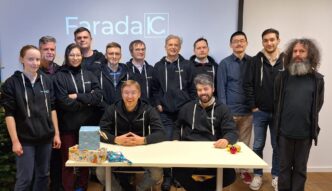Sagittal AI, a London-based startup, is making a bold entrance into the world of AI-powered software development with a new team member named Neo. Not a tool, but an AI that completes real development tasks within the tools companies already use. Backed by £2.2 million in fresh pre-seed funding, the company plans to accelerate Neo’s rollout. Helping teams across industries delegate complex and critical tasks to AI with greater confidence and minimal disruption.
The funding round was led by Twin Path Ventures and joined by SineWave Ventures, Fuel Ventures, Blue Lake VC, and angel investor Husayn Kassai. With the investment, Sagittal is doubling down on building AI that fits seamlessly into existing team workflows rather than replacing them. It’s a vision shaped by co-founders Michael Smith and José Palazon—two veterans with decades of experience in enterprise tech, AI, and cybersecurity.
Neo is designed to act like a real team member, not just another coding assistant. Unlike typical AI tools that demand context or oversight, Neo takes on entire software tasks from start to finish. Whether it’s implementing a new feature, generating multi-file pull requests, fixing CI/CD errors, writing unit tests, or even updating ticket statuses, Neo retrieves everything it needs from project management tools like Jira, GitHub, or internal documentation. Without requiring developers to copy-paste specs or set up environments manually.
This unique approach addresses a growing problem in the AI coding space. Most current tools either operate like fast-typing assistants or overpromise autonomy but fail to integrate with the rest of the workflow. Developers often end up spending more time managing the AI than writing code. Sagittal flips that narrative. Rather than forcing teams to adapt to AI, Neo adapts to the team. It respects existing processes, avoids unnecessary interfaces, and slots directly into how developers already collaborate.
In early pilots, Neo has already demonstrated what’s possible. At one enterprise customer, a task that typically took two to three days was completed in just 15 minutes. Neo handled everything—from retrieving relevant data to writing code and documentation—without the developer needing to step in mid-task. That kind of impact is rare in enterprise AI. Where most tools struggle to move beyond isolated demos or productivity claims.
Telefónica and several financial services firms in Europe have tested Neo in production environments. These pilots show that Neo can handle complex codebases and regulated industries. Delivering measurable value while preserving compliance and development standards. This real-world traction gives Sagittal a strong edge in a crowded market. And highlights the growing demand for AI that supports, rather than disrupts, team workflows.
Unlike tools like GitHub Copilot, Magic.dev, or Sweep.dev that focus on individual developer speed or isolated functionality. Neo addresses the full lifecycle of software development. It’s not about faster typing—it’s about end-to-end execution. The AI can code, review, document, and respond to feedback, all while fitting into a team’s Agile rhythm. The real advantage lies in its ability to deliver good-enough solutions that can be refined quickly. Rather than forcing developers to build everything from scratch.
Michael Smith, CEO and co-founder, explained that most AI coding tools fall short because they demand developers become middlemen. Constantly feeding context and switching between tools. “Despite millions invested in AI development tools, most companies can’t identify any measurable improvement in the metrics that actually matter,” he said. “There’s a deeper psychological barrier, too—teams are reluctant to delegate to AI due to perfectionism. But we’ve seen that even AI delivering 80% of the solution, when fully integrated into the workflow, creates exponential value.”
For Sagittal, this is about more than automation—it’s about enabling new patterns of delegation. CTO and co-founder José Palazon said that real transformation happens when AI mirrors how teammates already work. “When you assign a task to a colleague, you don’t list every file or copy-paste from multiple systems—you trust them to find what they need. Neo works the same way. It navigates shared context just like any other team member would.”
For investors like John Spindler at Twin Path Ventures, the value proposition is clear. “There’s a big gap between claimed AI productivity and measurable results,” he said. “We backed Sagittal because they understand that psychological and workflow barriers—not technical ones—are the real bottlenecks to AI adoption. Their approach of adapting AI to human teams is exactly the shift enterprise development needs.”
With its experienced leadership, proven pilots, and new funding in place, Sagittal AI is positioning itself as the company that will redefine what AI can do for software teams. By treating AI as a collaborative teammate rather than a coding gimmick, Sagittal isn’t just improving productivity—it’s building the trust and usability needed for AI to be truly adopted at scale.













